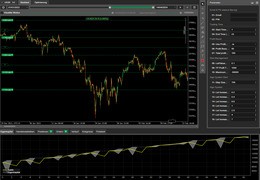Between reality and illusion If you want to know what trading really means—beyond luxury cars, piles of cash, and...
Search in blog
Blog categories
- FAQ – Your guide through the world of finance and technical facilities (2) click
- Daytrading Almanac (27) click
- Press release (23)
- Educational (26) click
- Projects (9)
- Chart analysis (39) click
- Trading bots for cTrader (11)
- AI in trading (5)
- Trading Strategien (11)
- Trading signals and stock market letters (46)
Latest posts

When it comes to traders, social media platforms often create a rather one-sided image: a young face smiling at the...

The TegasFX Instant Funding program sets a new standard for traders seeking quick access to capital without having to...

Backtesting trading strategies is an essential tool for traders who want to validate their methods across historical...

introduction In the world of trading, it can be challenging to balance the intense market activity and the rapid...
Popular posts





Featured posts





Photo gallery
No featured images
Archived posts
Top authors
-
 Christian Lill 70 Posts View posts
Christian Lill 70 Posts View posts -

-

-

-

Why a good trading coach doesn’t have to be a profitable trader
Why a top trader is not automatically a good coach
Four Science-Based Reasons Why Coaching Requires More Than Just Profit Numbers
In the world of trading, there is often an assumption that only top traders - people who have achieved high profits themselves - are able to successfully coach others. But this view is too simplistic. The following article explains why pure trading success does not necessarily guarantee good teaching skills and which scientific findings show that coaching is a demanding discipline in its own right.
1. Theory vs. Practice – why “ability” is not the same as “teaching”
A successful trader has sophisticated strategies and can apply them to himself. However, this does not automatically mean that he can also convey them skillfully. Pedagogical and didactic skills are at least as important as pure specialist knowledge.
Studies in educational research show that pure experts in their field often have difficulty putting themselves in the shoes of beginners. On the other hand, those who learn to present complex relationships in an understandable way create a solid foundation for the learning process - and that is exactly what makes a good coach.
Key point:
- Profound specialist knowledge alone is not enough.
- Didactic skills determine whether knowledge can be passed on in an understandable way.
2. Metacognition – the “why” behind every strategy
Metacognition refers to the awareness of one's own thought processes. A coach who keeps this concept in mind supports his protégés not only in how to trade, but also why they make certain decisions.
If you understand how your brain absorbs and processes information, you can adapt and improve your trading strategies. Research shows that learners are more likely to achieve long-term success when they reflect on their own learning - and this is precisely the fundamental added value that a coach can convey.
Key point:
- Metacognition promotes deeper understanding of strategies.
- Coaching is more than just “copying” – it is about independent thinking and learning.
3. The Dunning-Kruger effect – when success is blinding
The Dunning-Kruger effect describes how people with little experience tend to overestimate themselves, while real experts tend to be cautious because they know the extent of their knowledge gaps.
A top trader who can point to an impressive track record runs the risk of considering his method as "universal" and believing that anyone can achieve the same result by simply copying it. But this is exactly where the strength of a good coach comes into play: He addresses his students individually, recognizes their learning style and adapts the training program accordingly - instead of just promoting a single recipe for success.
Key point:
- Excessive self-confidence can obscure the view of different learning needs.
- A good coach remains flexible and recognizes that concepts for success are never rigid.
4. Psychological safety – the foundation for effective learning
Trading is often associated with pressure, stress and quick decisions. However, if learners are constantly afraid of making mistakes or embarrassing themselves, it is difficult to develop new strategies or to try things out openly.
One of the most important tasks of a coach is therefore to create an atmosphere of trust and appreciation. Psychological safety means that questions can be asked, doubts expressed and mistakes viewed as part of the learning process. Those who cannot provide this protected space may lead their coachees to frustration more quickly than to the next profit limit.
Key point:
- Mistakes are learning opportunities, not signs of incompetence.
- Without fear of evaluations, trading knowledge can be built up more sustainably.
Good coaches focus on learning processes, not just profit figures
Successful traders impress with great results, but not all of them automatically have the ability to teach others. A good trading coach impresses above all with:
- Didactic skills (making theory understandable)
- Metacognitive understanding (the “why” behind the strategies)
- Mindfulness of learning styles (avoiding the Dunning-Kruger effect)
- Psychological safety (trust and appreciation in the learning process)
This mix ensures that newcomers or even advanced traders can improve their own skills in the long term. A top trader who simply presents profits without taking the individual needs of his protégés into account, on the other hand, misses the core of coaching. Ultimately, successful coaching is about enabling people to develop their own potential - and this is precisely what methodological competence and empathy are needed for.
So if you are looking for a trading coach, you should not only look at profitability but also at the teaching skills. Because only when both come together can traders benefit in the long term and sustainably.
Leave a comment
Related posts
 Can you make a living from trading?
Can you make a living from trading?
 Basics
Basics
 Trading variants
Trading variants
 Fundamental analysis
Fundamental analysis
